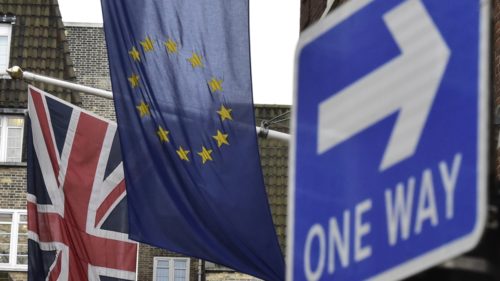Reject the bosses’ EU! For a Europe of working people – a voluntary socialist federation
Sascha Stanicic, Sozialistische Alternative (CWI in Germany)
Not for a long time has an event caused such controversial and, in parts, emotionally charged debate, on the Left as the majority vote by the population of the United Kingdom to leave the EU.
Left supporters of ‘Leave’ were accused by left supporters of ‘Remain’ of making common cause with right-wing populists, of facilitating racism or simply of having fallen for a “craze” (according to Angela Klein, who is a member of the Fourth International grouping formerly led by the late Ernest Mandel, in the left newspaper “SoZ”).
Without a doubt, a simple yes/no referendum on the question of the UK’s membership of the European Union was not the preferred battlefield for the Left. Neither of the two options on the ballot paper offered a solution for the social problems of the working class or posed the question of in what way or in whose interest the country should be run. A Leave vote was certainly no solution for anything. However the socialist Leave campaign, conducted by the Trade Unionist and Socialist Coalition (TUSC – which includes the Socialist Party (CWI), never claimed that it was. Their position was a different one.
Firstly, they pointed out that the question of a position towards the European Union was the subject of the vote. The political content of the vote could be reduced to the question of support for or opposition to the EU. Here, opinions on the Left diverge. Sections of DIE LINKE (the Left party in Germany), for example, argue that the EU was founded as a project of peace, representing a progressive and internationalist goal, but had merely been hijacked by the wrong (i.e. neoliberal) forces. Logically, left Remain supporters see the breakup of the EU as something threatening and make suggestions regarding how, hopefully, from their point of view, such a breakup can be prevented. It is logical to oppose leaving the EU from such a point of view.
This position was strengthened by the fact that both the official Remain and Leave campaigns were led by different sections of the British Conservatives and UKIP had a prominent role in the Leave campaign. This was in contrast to the last UK referendum on EEC membership in 1975. Back then, trade unions and the Labour Left (including Jeremy Corbyn) led the anti-EEC campaign.
Today, large sections of the socialist Left do not share this point of view. As the Lexit argument correctly ran, the EU is not a “neutral playing field”. It is not a vessel which can be filled with different contents. It is a complex of contracts between capitalist states, expressing the interests of the ruling classes of these states. It is and always has been a club of the bosses and the bankers (and their political representatives). The EU is militaristic, undemocratic and neoliberal. The decisive institutions such as the Commission and the Council of Ministers are unelected and the European Parliament is a toothless tiger. It was not founded to secure peace, but rather to push through capitalist interests. It does not represent Europe, but rather just a part of the states of Europe. It is an alliance of gangsters, comparable to a mafia cartel. Since when does combatting crime mean reforming criminal gangs?
From this assessment, it is clear that the question “for or against the EU” must be answered with an emphatic “against!” The answer of socialist Leave supporters in view of this limited question would therefore substantially be a negative one: ‘Against the EU!’ but not ‘For a capitalist Britain outside the EU’.

Leave = Weakening the Tories and the EU
Secondly, left supporters of Brexit argued that a majority for leaving the EU would weaken David Cameron’s austerity government, as well as the EU, which is committed to austerity. Such a weakening is to be welcomed, even if it does not automatically lead to an improvement of the living standards of the working class and the socially disadvantaged. It would, however, improve the conditions for struggles from below to win such improvements, if such struggles were to be organised.
Left opponents of Leave counter that the nationalist right and racism have been strengthened by the result. Angela Klein writes in Soz: “The extreme right – not the left – benefits from a deep crisis in society” and claims: “The success of Brexit is not just an indication of a politically misguided reaction to globalises capitalism, it is a massive threat to democratic rights, human rights, trade union rights and for all left attempts to take power away from the big owners of capital. The balance of social and political forces in Britain – and, who knows? Maybe in other EU countries too? – has been shifted massively to the right.”
Superficially, this assessment seems logical. After all, the Leave campaign was dominated by bourgeois right-wing nationalists – the right-populist Tory MP Boris Johnson and UKIP leader Nigel Farage. And since the referendum, reports of racist incidents increased.
“taz” Journalist Pascal Beucker commenting on facebook on the first article on the result by Lucy Redler and myself, wrote: “Effectively, you are making yourselves into useful idiots for Le Pen, Wilders, Strache, Gauland, Farage, Trump, Putin & Co.”. My question whether he supported TTIP just because Donald Trump and the AfD (Alliance for Germany – a far right, anti-immigrant party) oppose it, went unanswered. And according to this logic, one could not have advocated staying in the EU, because it would have meant putting ourselves on the same side as Cameron, the EU and financial capital.
But are Cameron and the EU not the lesser evil compared to Johnson and Farage? Would it not be correct to oppose Leave in order to stop the nationalist right?
Looking at the character and the actions of EU, a socialist should come to the opposite conclusion. People on the left had to be in favour of Brexit so as not to leave the field to the nationalists and racists. The mood in favour of Brexit / against the EU has its underlying reasons in the capitalist character of the EU and the social conditions of the British working class: the years of austerity, social cuts, wage cuts…etc.
Even if some on the Left dispute the class character of the leave vote, even bourgeois commentators felt compelled to point it out. The Guardian wrote: “Brexit is about questions of class belonging and a feeling of exclusion on the part of the voters.” And the Financial Times called the vote “the most class-based vote of the last decades”.
It is true that parts of the working class voted against Brexit, particularly young people and immigrants (although the turnout among young people was low). This is an indication that the wholly capitalist character of the EU was hidden behind the facade of “European values” and “internationalism”. Many voted Remain out of fear of a strengthening of the right wing populists and racists. All of this shows that there was no explicitly social option on the ballot paper which corresponded to the interests of the working class. But there can be no doubt that Leave was seen by many as an opportunity to inflict a defeat on the Tory government. This mood flowed from a reality of class politics and from the experience of the lowers layers of the working class. They could not be turned by arguments about the progressive nature of the EU and against UKIP’s racism. This is also borne out by the fact that one third of traditional Labour voters voted Leave, although the new left-wing Labour leader Jeremy Corbyn abandoned his long-held anti-EU position and advocated a Remain vote. Had he put himself at the head of the Brexit movement, it would not have been dominated by Johnson and Farage and it would have at least had a significantly more social (and left!) character in public. The class instinct expressed in the vote would have found a conscious political expression and the political situation today would be a very different one.
This point was made, among others, by the Anglican vicar of St. Mary’s in Newington: “Had there been a stronger Labour Brexit voice, the rage of the working-class discontents could have been directed towards its true target: advanced capitalism.”
But it is not true that the Leave vote has shifted the balance of power against the working class or the left, nor that the extreme right has been strengthened. On the contrary, the left commentator, Tariq Ali, wrote on Facebook on 4 July: “The result of Brexit on the home front: 1. Cameron gone 2. Boris [Johnson] is down and Gove will probably not win [the Tory leadership race] 3. Farage resigned 4. Corbyn still Labour leader and building mass support while opening up on the Scottish [independence] question and standing firm on the issue of refugees and migrants. (…) not a bad start…”
When the leaders of the nationalist right have been cleared aside (albeit Johnson returned as Foreign Secretary under the new prime minister, Theresa May), this can hardly be described as a strengthening. Opinion polls showing that even a majority of Leave supporters are in favour of residence rights for EU citizens, are also interesting. This shows that the increase in racist attacks since the referendum, while being a warning a necessitating a fightback, do not necessarily represent and qualitative strengthening of extreme right forces in the sense of an increase in their numbers, but rather that they have gained confidence.
The responsibility for the Right feeling strengthened and vindicated by the referendum result lies with both sides of the referendum campaign. Cameron and the Remain camp both used racist remarks and created the impression that Polish migrant workers were responsible for social problems, rather than government policies and the power of capital.
On this point, the national committee of DIE LINKE, in its resolution on the referendum, correctly points out that: “Racist attacks in the aftermath of the referendum must meet a determined fightback. However, racism was not created by the Brexit, rather it was fostered for years by the Cameron government, which, for example reduced welfare for migrants. Right elements on both sides contributed to a further rise in racism and the result is now being used by the right to incite racist hatred against polish residents in the UK. We stand in international solidarity and against every form of racism The right parties in Europe, such as UKIP, only developed because the EU, instead of overcoming national confines in favour of a cross-border society of solidarity, simply created an ever-inflating bureaucratic, undemocratic superstructure to regulate the common market interests of the banks and corporations.”
Left Leave campaigners always pointed to the danger of a strengthening of nationalists and racists. For example Dave Nellist, TUSC spokesman and former Marxist Labour MP, writing in the German leftwing daily newspaper Neues Deutschland explained that “There is a danger that – regardless which side wins – there will be a rise in racism and racist attacks. It looks very much like the murderer of Labour MP Jo Cox had connections to extreme right organisations. Therefore, in the aftermath of the referendum, it is necessary for the labour movement to carry out a strong campaign against the Tories, cuts, and racism. The voices of ordinary people were hardly heard during the campaigning for Thursday’s referendum. At the same time, there is growing support for the Exit side. Many working class voters see the referendum as an opportunity to protest against Cameron, the capitalist establishment and everything they have suffered over the last years: low wages, precarious jobs, lack of affordable housing and cuts to public services.”
Nothing is automatic
But nothing happens automatically. The consequences of the Leave vote depend decisively on how different political forces act. Angela Klein’s assessment, that the anti-capitalist Left in Britain has been “reduced to appealing for a fight against the racism spreading through the country” and to “resist the creeping coup against Corbyn’s leadership”, is wrong. In reality, the social question is pushing to the fore through the Leave vote. Why else did Theresa May, in her speech launching her campaign for the leadership of the British Conservatives, speak of the situation facing the working class? Why else did Sigmar Gabriel (Leader of the German SPD) react to the Brexit vote by calling for more social programmes? Because they – in contrast to some on the Left – understand the class issues at the core of the referendum. However, this also represents an opportunity for the trade unions and the Labour Left. The British ruling class wants at all costs to avoid fresh elections with Jeremy Corbyn leading the Labour Party – that’s the reason for the attempted coup against Corbyn by the Labour right. But the latter has failed, at least for the moment. Tens of thousands have joined Labour to support Corbyn. Thousands took the streets in several major cities. Besides the attempts to topple Corbyn, there were discussions about the formation of a new party of pro-EU Tories and right wing Labour MPs. These events are developing rapidly and their outcome is unclear.
My suggestion is: A bringing together of all left forces (inside and outside of Labour) by Corbyn, and a determined campaign for fresh elections and for a Labour Party committed to a clear anti-austerity programme, could make Corbyn the winner of the power struggle within Labour and as the next Prime Minister. This would be a horror scenario for the British and EU capitalism. The trade union leaders could also ensure that the tide turns. There have been important strikes by junior doctors and teachers, and the remnants of the British steel industry are in danger. Anger at the austerity imposed by the Tory government, but also by many Labour councils, is enormous. A call for coordinated strike action – a one-day general strikes and fresh elections, as discussed by left trade unionists, could have an enormous effect – again, strengthened by the Brexit vote, because the opponent – the Tory government – is on the ropes. All of this will not happen automatically. The British labour movement was also weakened in the last decades. Therefore, all the more depends on how the trade union leaderships and Jeremy Corybn act.
Refounding the EU?
The National Executive of DIE LINKE passed a resolution on Brexit, which is, in part, a realistic analysis of the Leave vote as, at its core, a social protest by the working class and impoverished layers. At the same time, it advocates a re-founding of the EU. This idea of “refounding” the EU is frequently propagated, because it can be interpreted in so many different ways – the idea of something “new” always sounds good. The good thing about this idea is that it rejects the existing EU treaties in their entirety and puts them under the spotlight. The bad thing is, that a framework is given, which is the European Union as it exists today, defined not by the working classes of the member states, but by the ruling classes.
Why stay within the framework of the EU? Why does DIE LINKE not argue for the necessity to completely replace the existing EU with a new cooperation of the peoples of Europe on an equal, democratic and socialist basis? And emphasise that it should not just include the 28 (or 27) EU member states, but also Switzerland, Norway, Sweden, and, yes, even Russia! Staying with the comparison with a major mafia cartel, anyone calling for the cartel to be refounded based on law and order would make a fool of themselves. A mafia cartel and law and order are contradictions. Anyone would agree that such a cartel should be broken up, their assets confiscated and redistributed so as to put the money to use in worthwhile way. The EU and social democracy and peace are also contradictions. It must be abolished and replaced by a completely new form of cooperation.
Angela Klein is correct when she writes that the new basis for a cooperation of the peoples of Europe will be reached via the route of getting left, anticapitalist governments into power in the nation state. This is true in so far as the EU has not overcome the nation state, which remains the decisive terrain in class struggle.
EU laws and directives make the class struggle more complicated because they represent and additional obstacle to be overcome in the class struggles which usually take place at national level. For example, in Ireland, a mass boycott of water charges forced the new government to back down and suspend the charges. But the EU commission said that the law to introduce the charges could not be repealed, according to European Law. EU Law also provides to prevent nationalisation of, for example, the British steel industry or railways –which are being called for by sections of the Left in Britain. Organising EU-wide struggle is much more difficult than at national level. Of course this must be done and it is possible, as seen in the struggle against the Bolkestein directive and the Ports Package. But fundamental change in society, simultaneously in the entire EU, while maybe conceivable theoretically, is very unlikely in practice.
However, Angela Klein is wrong when she writes: “Overcoming the capitalist nation state is a prerequisite for overcoming the capitalist EU project.” Leave proves the opposite. The EU is not all-powerful. Just like social concessions can be won within the framework of capitalism, the institutions of capital can be shaken and smashed, at the very least, individual states can leave such institutions. What these are to be replaced by, is a different question and depends on the course of the class struggle. But it is evident that the centrifugal forces in the EU are increasing and can be made even stronger by class struggles. This is a good thing, even though individual states leaving the EU in its present form (followed by the probable formation of a core EU around Germany) does not amount to socialism. And when there are no strong forces putting forward a socialist anti-EU position amidst this dissolution, there is the danger that this development will take on a nationalistic hue and strengthen forces of the right.
Abstention?
Of course, we could ask whether, given the complexity of the Brexit vote and the fact that right wing and racist forces campaigned to leave the EU, abstention would have been a better position. Some groups on the fringes of the labour movement who regard themselves as revolutionary and Marxists adopted this approach – and in doing so, remained on the fringes of the debate. This is what happens when one stays standing on the edge of the pool in a swimming race out of fear of getting wet.
Of course there are situations in which socialists abstain or call for people to spoil their votes. This is often the case when parliamentary or presidential elections are only between two bourgeois, pro-capitalist candidates. But even here, there can be exceptions, such as the most recent presidential elections in Austria. Here, the Socialist Left Party (CWI section in Austria) and others on the Left called on voters to prevent a victory of the FPÖ candidate Hofer by voting for the green (and therefore bourgeois pro-capitalist) candidate Can der Bellen. Why? Because the effect in society of an FPÖ victory would be much more negative for the labour movement, for the Left and for the socially disadvantaged. So one can base a voting decision not just on the protagonists standing for election, it is also necessary to consider the impact of different outcomes on society and also on the balance of forces between the classes and the consequences for the rebuilding of the labour movement. In this regard, there can in my opinion be no doubt: A majority for continued EU membership would have strengthened the Tory government, strengthened the EU, accelerated TTIP etc. An abstention would, in reality, only have helped the Remain camp. Therefore, for the reasons explained above, those on the Left could not have taken an indifferent stance towards the referendum.
Conclusion
The EU referendum in the UK was a watershed event and, as all such events are, it was a test for the Left. The Leave vote caused a crisis in the UK and in the EU which will stay with us for a long time. The question of how to react to this, as regards the internal political issues in Britain, cannot be made dependent on ones position to Brexit. On the issue of supporting Corbyn against the Labour right, this is luckily not the case, and many of those defending Corbyn supported “Leave”.
But the question of how the Left positions itself towards the EU is of great importance. To prevent the justified anti-EU mood being exploited by right populist and racist forces, as is happening in other countries, the Left must take a clear and unambiguous stance against the EU of the banks and corporations. In some left parties, such a process of discussion has already begun. For example, the Portuguese Left Bloc, which in the past adopted more of an uncritical approach to the EU, has now spoken out clearly against the EU. A rejection of the EU must, however, go hand in hand with the pointing out of a positive alternative beyond a capitalist EU and capitalist nation states – a Europe of working people, a voluntary socialist federation of European states.




